Video Gamer is reader-supported. When you buy through links on our site, we may earn an affiliate commission. Prices subject to change. Learn more
Want to know about Baldur’s Gate 3 abilities? These stats determine the outcomes of nearly every interaction in the game. Set in the D&D Forgotten Realms setting, dice rolls are an important part of this sprawling RPG.
Each of Baldur’s Gate 3 classes and subclasses features unique skills and a weapon proficiency bonus that are further augmented by your ability scores. And if you’re looking for a cute pet, here’s how to get the Owlbear cub in Baldur’s Gate 3. So read on to know more about ability scores now that the game has launched.
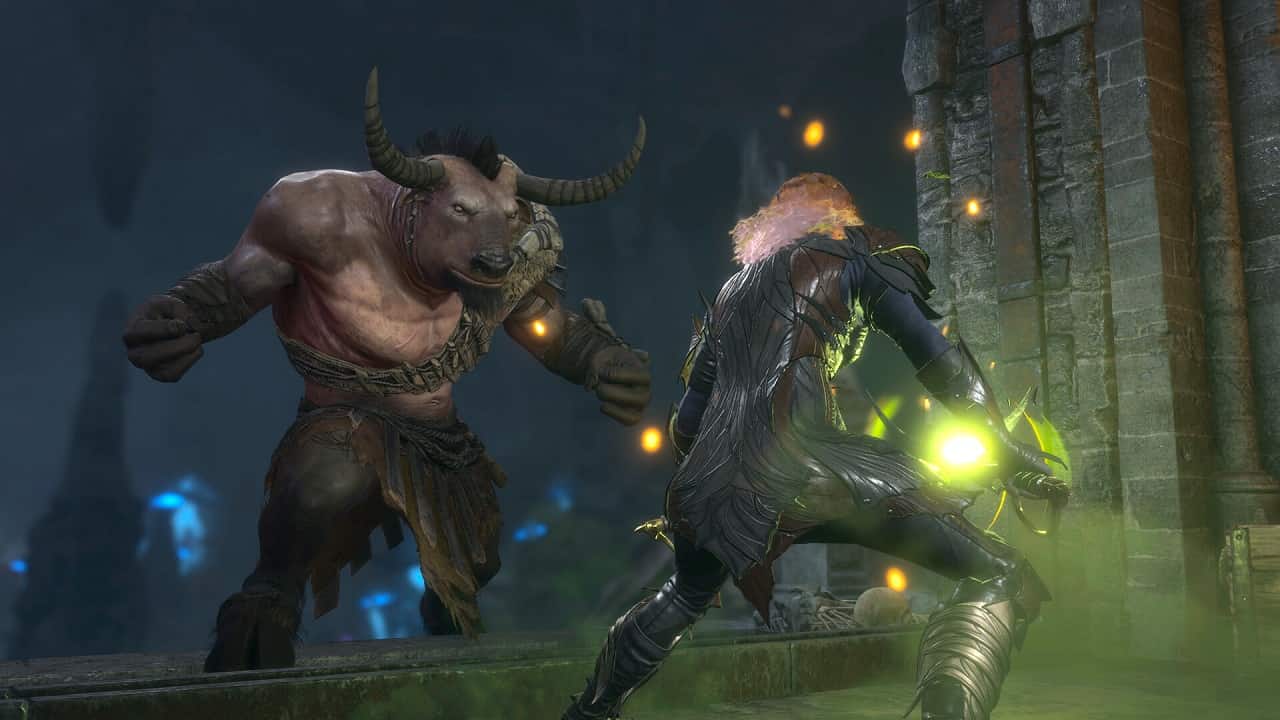
Baldur’s Gate 3 abilities
There are six core Baldur’s Gate 3 abilities: Strength, Dexterity, Constitution, Intelligence, Wisdom and Charisma. Each of them influences different skills in the world of Faerun. These can be picked in the character creation section before starting a BG3 playthrough. Inspired by Dungeons & Dragons, you have the option to earn two ability points for every four levels.
These can be put into one of these six abilities. They are essential to clearing skill checks such as opening a door or performing an attack. This means that abilities are useful both in combat and in navigating the world and its storylines.
Best abilities for each class in Baldur’s Gate 3
Here’s how you should prioritize abilities in Baldur’s Gate 3:
- Strength – primary stat for Fighter, Barbarian, Paladin
- Dexterity – primary stat for Ranger, Rogue
- Constitution
- Intelligence – primary stat for Wizard
- Wisdom – primary stat for Cleric, Druid
- Charisma – primary stat for Warlock, Sorcerer, Bard
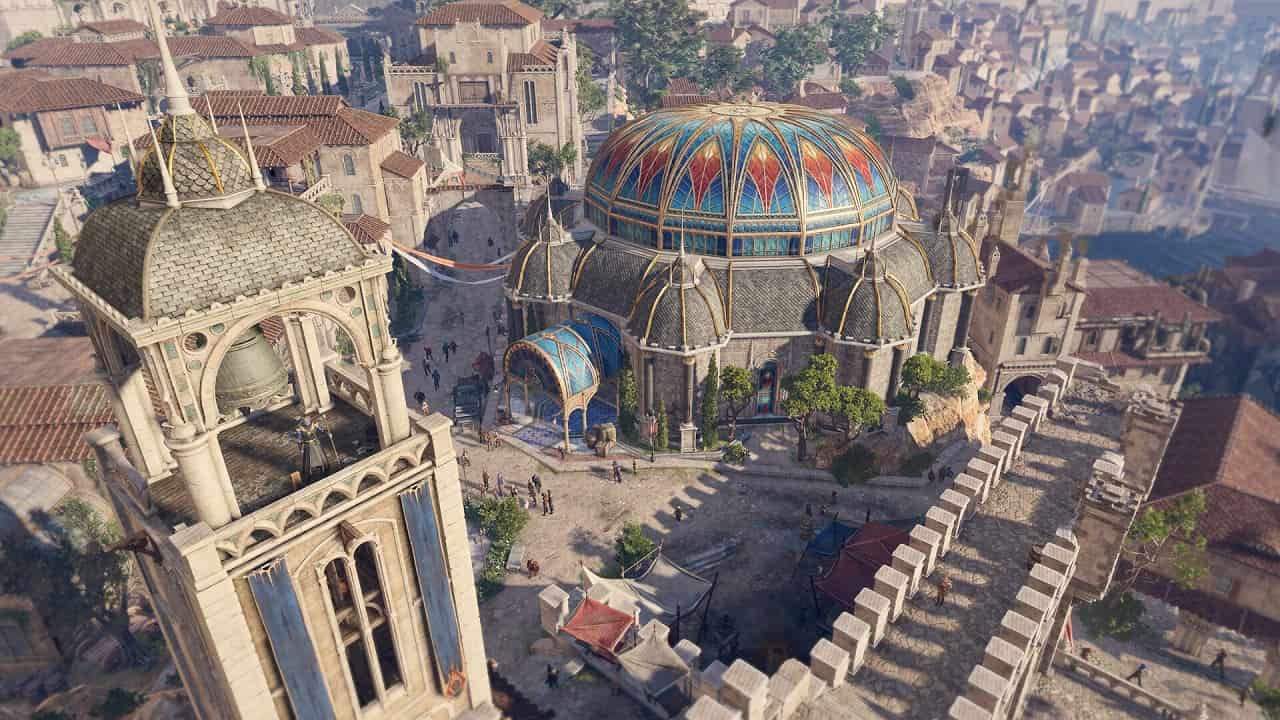
How to improve ability scores in Baldur’s Gate 3
You get to pick which abilities you want to add points to right at the beginning of the game. Note that races no longer affect Ability points. Only your class has any impact on the points you can spend on each Ability.
After you reach level 4, you can use one of Baldur’s Gate feats to gain two bonus Ability points. You can do this two more times (Ability Improvement feat) at level 8 and level 12 before you hit Baldur’s Gate 3 max level. You can choose to compensate for your class weakness or double down on your strengths.
For instance, improving your Intelligence as a Wizard will make your spells hit harder. The Wizard could instead choose to improve their Strength to protect them from Strength saving throws in the game. Succeeding a saving throw for any ability after an enemy attack will reduce or eliminate their effects.
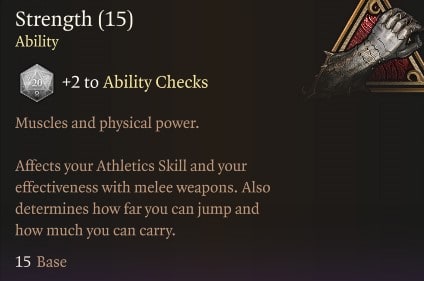
Here’s how all the abilities in Baldur’s Gate 3 work:
Strength (Str)
Strength plays a big role in combat encounters. It determines your chance to land an attack and the damage you deal with Strength-based melee weapons like the rapier or longsword (attack roll). This stat also affects how far you can jump and how much you can carry. It’ll come in handy for tasks like opening doors or lifting objects. Strength checks can also happen in quests. For example, here’s how to save Baelen in Baldur’s Gate 3. Strength influences the following skill:
- Athletics
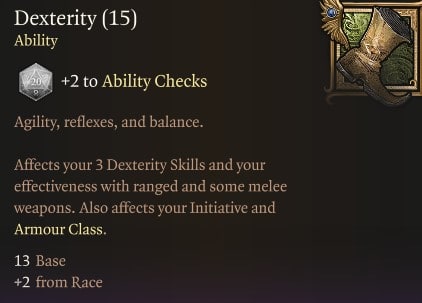
Dexterity (Dex)
Dexterity affects Dexterity-based weapons and their chances of landing a hit. It’s also a key part of Initiative, the stat that determines the order of combat. Rogues tend to use these weapons. And yes, Baldur’s Gate 3 is turn-based. It also determines your Armour Class, the odds of you being hit in the role-playing game. Remember that the Armour class also depends on the armour (light armour, medium armour, heavy armour) and a shield too. Succeesing Dexterity saving throws lets you take half or even no damage from certain spells. Dexterity influences the following skills:
- Acrobatics
- Sleight of Hand
- Stealth
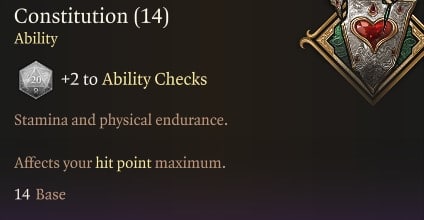
Constitution (Con)
Constitution influences the maximum health points (HP) of your character. Take more damage than this value and you’ll be incapacitated. It also influences some ability checks. While Strength-based characters like Barbarians have high resilience thanks to this stat, it’s also the reason why some other classes can’t sustain combat wounds. It also opens up some dialogue choices related to sustaining injuries.
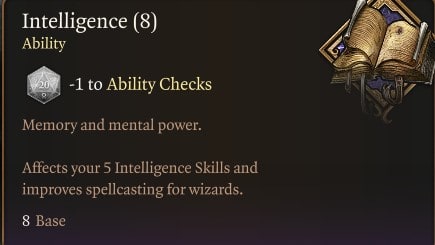
Intelligence (Int)
Intelligence is used by Wizards as their spellcasting ability. This means that it determines how often magic spells will land on their targets. Make the most of your spell slots with high Intelligence. A good Intelligence value also lets you answer questions based on the beings of the Forgotten Realms, be it about their lore or nature. Intelligence influences the following skills:
- Arcana
- History
- Nature
- Investigation
- Religion
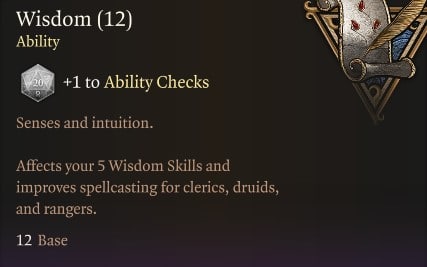
Wisdom (Wis)
Wisdom is used by the Druid, Ranger, and Cleric classes as their spellcasting ability. High Wisdom values mean a higher chance of your spells hitting. It also gives you keen senses that let you spot things that regular characters might miss. This also protects you from spells that make you use Wisdom saving throws. Wisdom influences the following skills:
- Animal Handling
- Insight
- Medicine
- Perception
- Survival
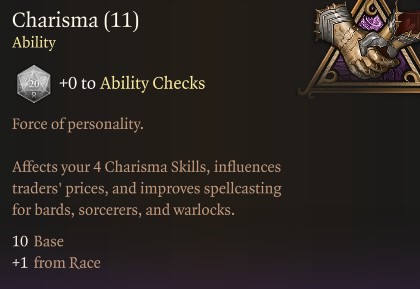
Charisma (Cha)
Charisma is used by Bards, Paladins, Sorcerers, and Warlocks as their spellcasting ability. It can also be used to convince or deceive characters you encounter in the world. It’s a powerful tool and a party should have at least one character with a high Charisma stat. This also lets you trade for better rates with vendors across the Forgotten Realms. Charisma influences the following skills:
- Deception
- Intimidation
- Performance
- Persuasion
Don’t try to be a jack of all trades
Each race and class values some ability scores more than others. So lean on your strengths and let party members compensate for your weaknesses.
That covers all Baldur’s Gate 3 abilities. While creating your character, you’ll be able to pick where your ability points go. But leveling up also lets you reshape your character with two additional ability points for every four levels. Your allies can pick from the available races and their choice of skill proficiency can augment your own hero. For instance, a hand crossbow character can be protected by one holding a shortsword or even a greatsword.
Specific features of the Baldur’s Gate 3 races like the Dragonborn, Halflings, Gnomes and Tieflings might go well with specific ability scores. Subraces like the Mephistopheles Tiefling and Zariel Tiefling grant even more unique perks. But you can respec them to your liking. And keep track of Baldur’s Gate 3 feats as they can help you level up and progress in the game.
BG3 Abilities FAQs
How do abilities work in BG3?
Increase your Ability Score by two to increase its modifier by one in BG3.
How important is charisma in Baldur’s Gate 3?
Charisma helps with conversations and lowers shop prices in Baldur’s Gate 3.

